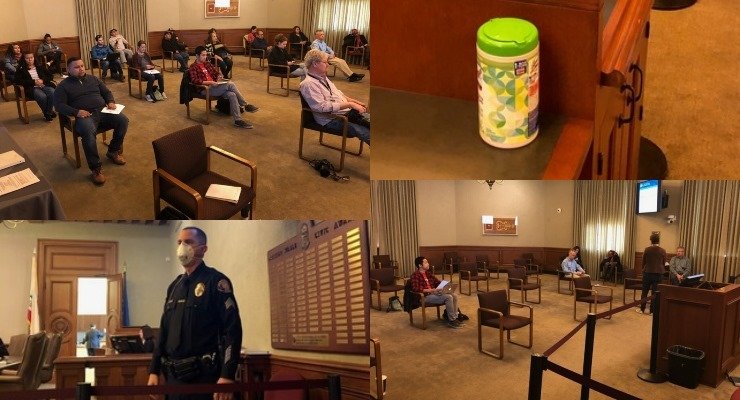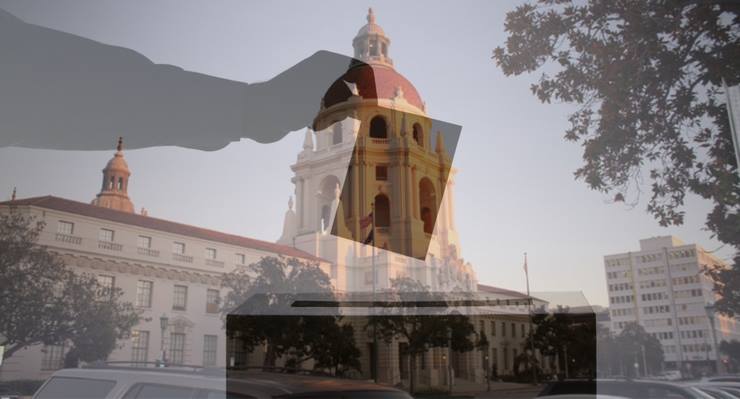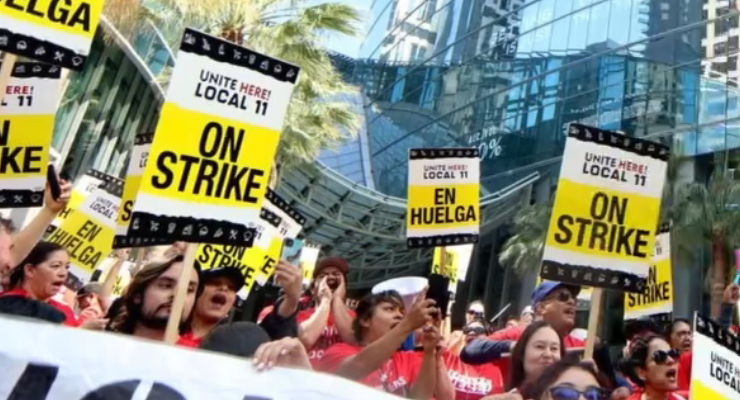
The City Council, meeting in special session Tuesday morning — and with most of its members participating remotely — approved a series of items aimed at helping Pasadena survive the economic body blows it continues to absorb from the escalating COVID-19 crisis.
Most prominently, the council approved an eviction moratorium, safeguarding both residential and commercial renters for non-payment if those renters have been affected economically by fallout from the pandemic.
A day after City Manager Steve Mermell declared a local emergency (which was formally ratified Tuesday, in another council action), council members met for nearly six hours in sparsely populated Chambers, with the crowd limited by design and spectators’ chairs spaced six feet apart instead of the elbow-to-elbow accommodations usually provided.
The set-up was in deference to the social-distancing practices that are recommended to guard against the spread of the highly contagious COVID-19 virus. In addition, the two police officers assigned to the meeting wore protective masks throughout, and hand sanitizer was in liberal use.
Among council members, only Vice Mayor Tyron Hampton and Councilman Victor Gordo were in the room. The other council members participated via conference call.
Hampton presided over the meeting, with Mayor Terry Tornek still en route home from Africa, according to the city. Tornek and Councilman John J. Kennedy led a delegation to Pasadena’s sister city, Dakar-Plateau, Senegal. Kennedy flew home in time to participate in Tuesday’s meeting remotely; Tornek did not.
Mermell, City Clerk Mark Jomsky and City Attorney Michele Bagneris were also in attendance.
The meeting was scheduled to begin at 11:40 a.m., rather than the normal 6:30 p.m. start time, but didn’t take wing until some nine minutes later, after technical bumps in getting all the council members patched in by phone.
After that, the council commenced a series of actions it hopes will soften the economic impact of the pandemic in the city. Besides the eviction moratorium, the moves included:
- Suspending late fees and penalties for city services such as water, power and garbage pickup.
- Suspending utility shutoffs for non-payment.
- Modifying various parking rules, including: the temporary suspension of metered parking enforcement to facilitate delivery and curbside pickup zones for food from restaurants; the temporary suspension of non-critical vehicle impounds; and the temporary suspension of impounds of vehicles with five or more past-due parking citations or expired registrations.
The council also approved using up to $150,000, at least initially, from the city’s general-fund reserves to start a meals program for seniors, the disabled and other vulnerable citizens. That matter will be revisited, and perhaps revised, in future meetings.
In addition, council members brainstormed and eventually approved an array of other potential economic-relief moves, particularly aimed at small businesses, that will be on the agenda at a subsequent meeting. Those included:
- A fund to assist businesses ordered not to operate during the COVID-19 crisis, such as restaurants now limited to take-out service; bars; and gyms.
- Possibly suspending various fees and utility costs for some businesses.
- Possibly suspending overnight parking restrictions, and/or relaxing some parking restrictions in the business district.
- Exploring rental assistance for tenants.
- Exploring emergency loans for businesses.
- Securing cleaning supplies for seniors.
Gordo, on Monday, said the city has about $70 million in its reserve fund, and that some of that money could be ticketed to finance initiatives such as that.
“If we set aside a few million of that to help cover utilities, to help cover rent support, to help cover some of the sales tax implications … I think that we should look at it closely,’’ he said.
The eviction moratorium will be in place as long as the city’s local emergency remains in effect. As originally written, it required tenants facing eviction to show proof that their inability to pay rent was a direct result of the COVID-19 crisis.
But Councilman Steve Madison objected to the burden of proof landing so heavily on the tenants, and the language was loosened to read, simply, “no landlord shall endeavor to evict a tenant in either of the following situations:
“(1) for non-payment of rent if the tenant is unable to pay due to financial impacts related to COVID-19 or,
“(2) for a no-fault eviction unless necessary for the health and safety of tenants, neighbors or the landlord.’’
The moratorium further states that “a landlord who knows that a tenant cannot pay some or all of the rent temporarily for the reasons set forth above” cannot move to evict that tenant.
It applies to businesses and well as residential renters.
Significantly, the moratorium requires that any unpaid rent be satisfied within six months of the city emergency being officially lifted, a move that would have to be approved by the council.
That was an element that one speaker, during public comments on the matter, objected to — saying that six months is an unfairly short amount of time for tenants who’ve been hit economically by COVID-19 fallout to recover financially.
But Bagneris, the city attorney, pointed out that that element of Pasadena’s moratorium was in line with that of Santa Monica, on which the Pasadena measure was modeled.
In addition, Housing Director Bill Huang, who was also in attendance on Tuesday, said that Pasadena’s share of Measure H tax funds, designed to prevent homelessness, might be directed toward mitigating at least some of those rent-repayment costs.
Of course, it remains to be seen if the council’s actions Tuesday, or any possible subsequent relief moves, will have a significant impact on an economic crisis that is only beginning to come into focus.
Monday, Mermell’s local emergency order closed “all bars, gyms and fitness centers, private social clubs and sit-down restaurant service in the city … immediately, with the exception of take-out and delivery services.’’
In a meeting with Gordo on Monday, several restaurant owners said their businesses were already down by between 65 and 80 percent.
Paul Little, president and chief executive officer of the Pasadena Chamber of Commerce, remains very worried.
In a letter to Pasadena Now, Little wrote, “My biggest fear is that, absent significant action now on the part of the City of Pasadena to alleviate costs for businesses, there may not be many locally owned small businesses left if this crisis stretches beyond March and April.’’
All of Tuesday’s council moves passed unanimously.














 0 comments
0 comments


